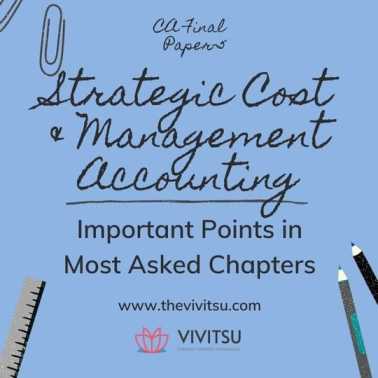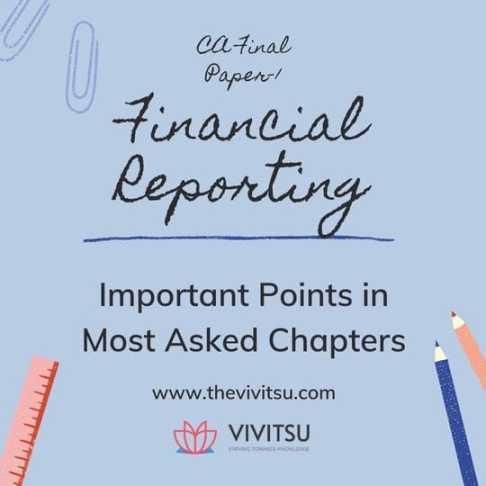Strategic Financial Management
- CA Khushi Shah . 1319+ Reads
Derivatives- 15 marks
- Get your concepts clear. Even if no basic questions are asked in the exam, solving such questions will give you clarity and will assist you in solving difficult questions. Lot of students directly start solving different types of sums without understanding what the question is essentially asking.
- Theory is equally important. A lot of theory questions are asked from this chapter, hence studying the theory will give you an edge over other students.
- Foreign Exchange Exposure and Derivatives are interlinked. You will find many sums on foreign currency derivatives. Always do foreign exchange exposure chapter after derivatives.
- The concepts of forward & future contracts is very important. Do as many sums as possiblr relating to these concepts.
- Following types of questions are a MUST DO & are usually asked in exams-
- Valuation of Forward & Future Contracts
- Option Valuation Techniques (Binomial Model, Risk Nuetral Model & Black Scholes Model)
- Embedded Derivatives
Foreign Exchange Exposure- 11 marks
- Get the basic concepts at the tip of your fingers. These concepts will help you solve sums faster.
- direct & indirect quote
- Bid, Offer & Spread
- Cross rates
- Forward & Spot rate calculation
- Remember that if you don’t get the basic concepts right your entire answer can go wrong. This chapter must be studied in detail and each individual concept has to be given importance.
- For the Last Day revision for this chapter practice the basics instead of the difficult sums. Perfecting this and recollecting it without confusion in the exam will guarantee you a couple of marks for sure.
- The Following types of questions are popular in this Chapter-
- Fates of Forward Contract (Extension/Cancellation etc)
- Exchange Rate theories (IRP, PPP & IFE)
- Foreign Exchange Exposure (Transaction, Translation & Economic)
- Option Contracts (Call/Put Options)
Portfolio Management- 14 marks
- Have a formula sheet ready for this Chapter. It will not only help you in Last Day Revision but you can use it as a reference point during practicing questions as well. There are a lot of formulas in this Chapter hence having a reference book helps.
- This is the lengthiest chapter and it also a very dry. The trick is to do only the important concepts which are usually asked in exams. If smart study is not used in this chapter then it will lead to wastage of time. The time spent to the marks covered ratio will be low.
- Important Topics you should study:
- Risk & Return
- Measurement of Systematic Risk
- Portfolio Risk & Return Calculation
- Capital Asset Pricing Model
- Aribtrage Pricing Theory
- Porfolio Revision & Revaluation
Corporate Valuation-13 marks
- Calculation of PV plays a major role in this chapter. Master the calculation of this concept and you have a couple of marks in your pocket.
- EVA & MVA Calculation is a frequently asked question type and is simple to understand.
- Different types of questions asked during exams-
- Methods of Valuation (Asset, Earning & Cash flow based)
- Measuring Cost of Equity
- EVA & MVA
- Theory on other approaches of Valuation (Chop shop method, Shareholder Value Analysis etc)
- This and the next chapter Mergers & Acquisitions have a lot of topics which are common with FR. Which ever subject you select to study first make sure you strengthen your concepts.
Mutual Funds- 11 marks
- This is one of the smallest chapters in SFM (only 3-4 different types of sums) and is usually always asked in the exam. Hence studying it properly will guarantee you a couple of marks.
- Different types of sums asked-
- Calcualtion of Return on Investment
- Calculation of NAV
- Comparison between yields of different MF
Security Valuation- 11 marks
- The CAPM Model is a very important concept. Master sums of this type as it will be helpful while studying Portfolio Management too.
- In Dividend Valuation Model, taking growth into consideration is important. This is usually missed out during solving sums.
- PV Calculation is 70% of the answer in all questions.
- Types of questions asked-
- Valuation of Equity Shares (Dividend, Earning & Cash flow based models)
- Valuation of Rights
- Valuation of Pref shares,
- Valuation of Bonds & Debentures

















.jpg)










